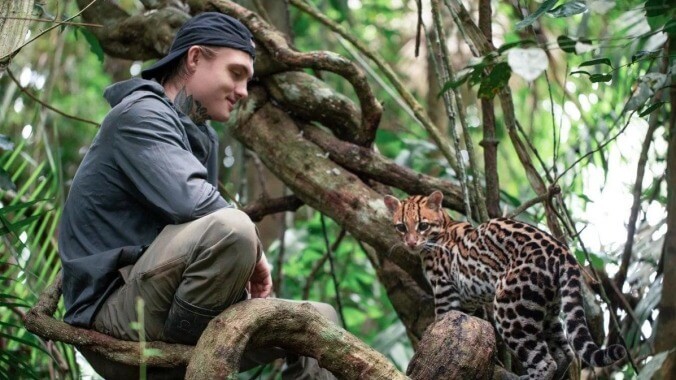Wildcat review: a veteran and an ocelot have more in common than you think
An Afghan War vet confronts his PTSD with the help of an ocelot kitten in Melissa Lesh and Trevor Frost's moving documentary

If, after seeing Avatar: The Way Of Water multiple times in each conceivable format, you find yourself looking for more content about an unhappy combat veteran who travels to a rainforest, falls in love, and bonds with a feline, the documentary Wildcat (in select theaters December 21, on Prime Video December 30) has you covered. Just to be clear: in this one, the feline and the love interest are not one and the same. The veteran is Private Harry Turner, of England, who signed on to fight in Afghanistan right out of secondary school. The rain forest is the Peruvian Amazon. And even more so than the pretty, aspiring doctor, Sam, who rescues baby animals, the veteran’s love interest is an ocelot—or two—that helps Harry battle back from depression and PTSD.
When it comes to pet people, dog owners are disproportionately represented in the movies, mainly because dogs are trainable, while cats, like the Rage Against the Machine song, essentially go “Fuck you, I won’t do what you tell me.” It takes documentaries to capture the essence of cathood and cat ownership. Before we proceed further, however, we need to insert a major trigger warning/spoiler alert: one of the two main cats depicted onscreen in Wildcat dies. When one has worked in a movie theater, and seen every movie that features a pet death invoke angry demands for refunds, this feels necessary to mention, especially since it happens during the first half of the film.
That aside, there are lots of cute kitty antics here, as Harry and Sam’s goal is to achieve a first—raise an ocelot kitten in captivity and then release it into the wild at 18 months. The heart-rending paradox is that in order to properly do that, they have to ensure that the kitten they’ve come to bond with no longer wants to be with them nor thinks of humans as anything but a danger. Tiger King may have implied that there’s a quick transition in big cats from pettable kittens to large, hostile man-eaters, but that’s mainly because Joe Exotic is a narcissistic loon. For anyone with actual empathy, the process is much tougher, and indeed, by showing us the ocelots named Khan and Keanu from infancy on up, the movie puts us through that emotional process as well.
Harry makes a connection with the cats immediately, not just because they’re cute but, like him, they are also fragile young things that have to learn to kill. He becomes, in a way, both parent and drill instructor, demonstrating the tough way in which creatures will and won’t fight back, and how to attack them. It’s getting the cat back to its nature while also helping him undo all the combat training contrary to his humanity.
Wildcat also upends the sort of grounded dreamgirl narrative this story might convey in fiction, as Sam is the kind of noble, attractive, intelligent, and capable woman that the hero would normally do anything for, and become a better man in the process. But she also has her own traumas, as seen in old home videos. Those traumas don’t magically fix themselves when one meets a good partner; nor, indeed, will Harry’s. Animals have short memories for moody spells but people don’t.
Melissa Lesh and Trevor Frost make their documentary feature directorial debuts here, and they obviously have a taste for jungles, as their next film involves orangutans. Using a lot of night vision footage and clever editing of what must have been many different takes of the kitties together to look like single scenes, they’re clearly quite expert at this. The cats may not behave on command, but the directors clearly know them well enough to anticipate where to be. It doesn’t hurt that Harry’s pretty good at this too, and ample footage comes from his cameras.
Yet if Harry still feels a bit unknowable by movie’s end, it’s probably because he is in real life. Why, for example, is the front of his body covered in tattoos, and his back pristine? Subsequent events make clear that it’s a significant choice, but we are left to infer the details. We do come away with the sense that he’s more stable, and that caring for something fairly resilient played a large part in that. Nobody would ever suggest becoming a parent as a cure for getting over your issues, but a “pet dad?” Well, let’s just say an ocelot comes better equipped for survival than an infant human.
Wildcat may have a tiny fraction of Avatar’s budget, and the bad guys—loggers, mostly—remain off-camera. But at heart, it has the same appeal. Get back to nature, put others first, be as good to your family as you can, but let them go their own way. These feel like universal truths. For the folks who prefer them without CG enhancements, or who just love watching dangerous kittens be kittens in the Amazon basin, consider your cinematic catnip delivered.